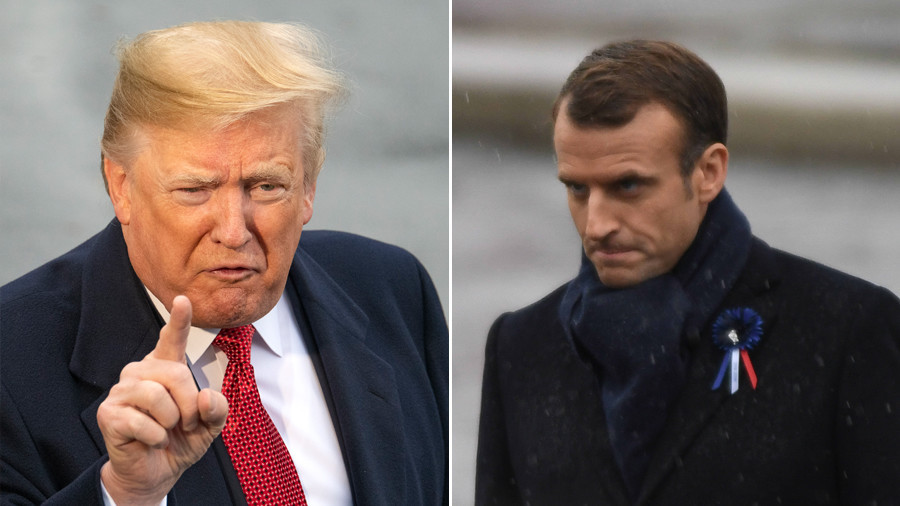'They were starting to learn German in Paris before US came along' – Trump taunts Macron

After returning from Armistice Day commemorations in Paris over the weekend,
Trump took to Twitter on Monday to savage the US’ European allies for failing to
meet their defense spending targets and leaving America to foot much of NATO’s
bill. On Tuesday, the president vented his frustrations again.
"Emmanuel Macron suggests building its own army to protect Europe against the
U.S., China and Russia,” Trump tweeted.
But it was Germany in World Wars One & Two - How did that work out for France?
They were starting to learn German in Paris before the U.S. came along. Pay for
NATO or not!
In a radio interview a week before the commemorations in Paris, Macron called
for the establishment of an EU army that can defend the continent "without
relying only on the United States.”
While Macron once enjoyed a close bond with president Trump, the leaders’
relationship has soured as of late. In a speech on Sunday, Macron emphatically
denounced Trump’s brand of nationalism, comparing it to the forces that plunged
Europe into conflict in the 20th Century.
"Old demons are resurfacing,” the French president warned. "History sometimes
threatens to take its tragic course again and compromise our hope of peace. Let
us vow to prioritise peace over everything.”
Macron also stuck close to German Chancellor Angela Merkel - herself a vocal
Trump critic - throughout the weekend, with the pair posing in an embrace at the
unveiling of a plaque near Compiegne, where Germany officially surrendered 100
years previously.
Whether Trump’s Tuesday tweet was meant as a jibe at Merkel and Macron’s
closeness or not is unclear, but the president’s insistence that Europe pays its
NATO dues is a call that he has voiced since he hit the campaign trail three
years ago.
At present, only five NATO member states – the US, UK, Greece, Estonia, and
Poland – allocate two percent of their GDP to defense spending, a requirement
for membership. In 2017, the US spent $686 billion on defense, over double the
expenditure of all 28 other states combined.
While Macron is now in Trump’s firing line over defense spending, the US
president had singled out Germany in the runup to a NATO summit in Brussels in
July. As well as savaging Merkel’s government for spending just over 1.2 percent
of its GDP on defense, Trump said that Germany is "totally captive to Russia,”
referring to its reliance on Russian gas.
While the US underwrites most of Europe’s defense bill, more EU leaders than
Macron have expressed discomfort at relying on Trump in recent months. Liberal
MEP Guy Verhofstadt - a long-time advocate for a federal Europe - echoed
Macron’s comments on Saturday, when he tweeted that Europe cannot be "unprepared
for the America First Policy.”
The idea of an integrated EU army might make Macron and Merkel excited, but it
has been criticized by more people than just Trump. NATO Secretary General Jens
Stoltenberg responded to Macron’s radio interview by warning the French
president not to take over NATO’s job.
"Two World Wars and a Cold War taught us the importance of doing things
together,” he said at a conference in Berlin on Monday. "The reality is that we
need one strong and capable command structure, we can’t divide those resources
in two.”
















